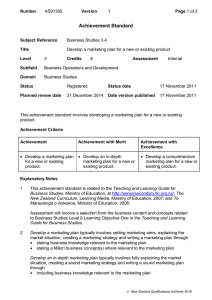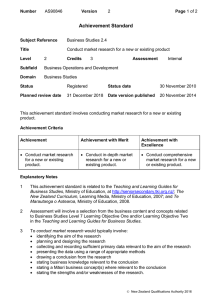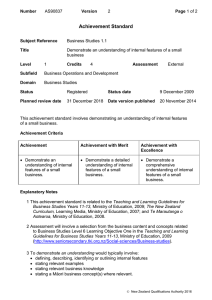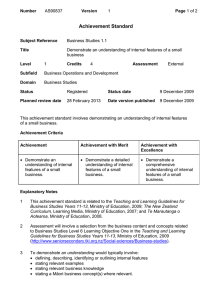NZQA registered unit standard 26531 version 1 Page 1 of 4
advertisement
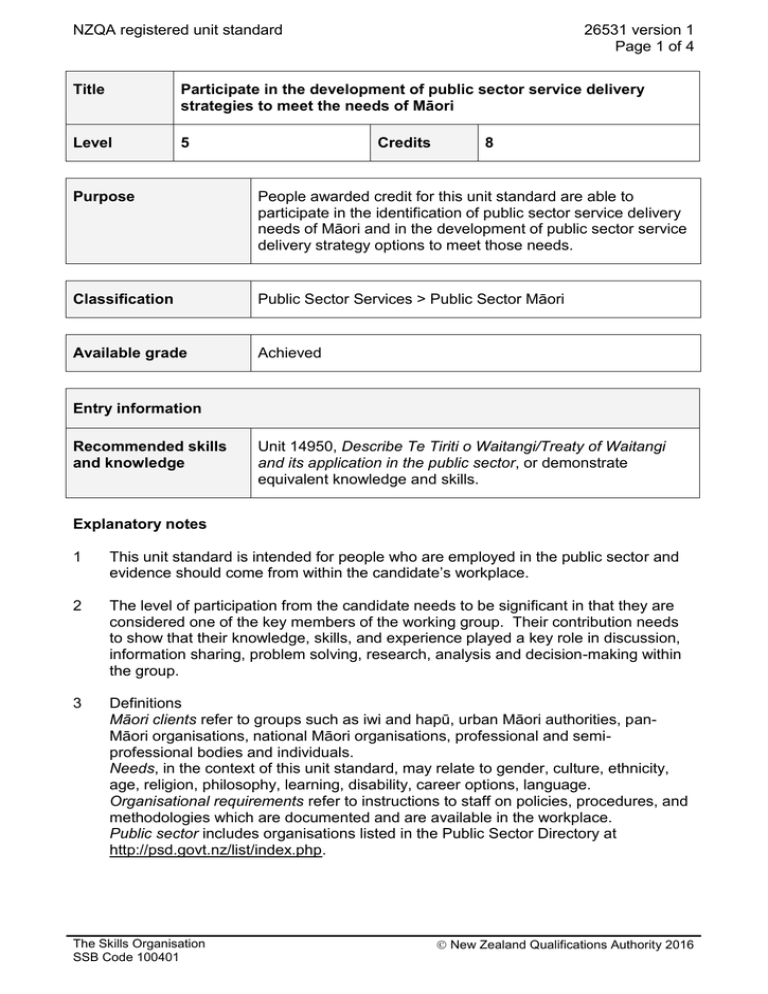
NZQA registered unit standard 26531 version 1 Page 1 of 4 Title Participate in the development of public sector service delivery strategies to meet the needs of Māori Level 5 Credits 8 Purpose People awarded credit for this unit standard are able to participate in the identification of public sector service delivery needs of Māori and in the development of public sector service delivery strategy options to meet those needs. Classification Public Sector Services > Public Sector Māori Available grade Achieved Entry information Recommended skills and knowledge Unit 14950, Describe Te Tiriti o Waitangi/Treaty of Waitangi and its application in the public sector, or demonstrate equivalent knowledge and skills. Explanatory notes 1 This unit standard is intended for people who are employed in the public sector and evidence should come from within the candidate’s workplace. 2 The level of participation from the candidate needs to be significant in that they are considered one of the key members of the working group. Their contribution needs to show that their knowledge, skills, and experience played a key role in discussion, information sharing, problem solving, research, analysis and decision-making within the group. 3 Definitions Māori clients refer to groups such as iwi and hapū, urban Māori authorities, panMāori organisations, national Māori organisations, professional and semiprofessional bodies and individuals. Needs, in the context of this unit standard, may relate to gender, culture, ethnicity, age, religion, philosophy, learning, disability, career options, language. Organisational requirements refer to instructions to staff on policies, procedures, and methodologies which are documented and are available in the workplace. Public sector includes organisations listed in the Public Sector Directory at http://psd.govt.nz/list/index.php. The Skills Organisation SSB Code 100401 New Zealand Qualifications Authority 2016 NZQA registered unit standard 26531 version 1 Page 2 of 4 Service delivery refers to activities carried out by organisations that are oriented towards meeting customer needs and expectations. Service delivery that strives to meet the needs of Māori is based on the acknowledgement of differences between ethnic backgrounds, for example, social standing, belief structures, values base and past experiences. This acknowledgement resists any assumption that the rules familiar to the majority will be used when people of different ethnic backgrounds interact. Te Tiriti o Waitangi refers to the Māori language text of the Treaty. The principles of the Treaty refer to the core concepts that underpin the Treaty. The Court of Appeal and the Waitangi Tribunal have developed a number of detailed principles, of these the principles of ‘partnership’, ‘active protection’ and ‘redress’ are considered dominant. The Treaty refers to both Māori and English language texts considered as a whole. Treaty of Waitangi refers to the English language text of the Treaty. 4 Conducting research with Māori clients raises a number of ethical and methodological considerations which must be reviewed carefully. Any work in this area should be negotiated in detail with the programme provider, to ensure research is conducted in an effective and sensitive manner. Kaupapa Māori research methods should be considered. 5 Performance of outcomes of this unit standard will require consideration of the underlying values and responsibilities of people working in the public sector including standards of integrity and conduct and the Te Tiriti o Waitangi/Treaty of Waitangi and its principles. Outcomes and evidence requirements Outcome 1 Participate in the identification of public sector service delivery needs of Māori. Evidence requirements 1.1 Identify areas for improving public sector service delivery options for Māori whilst co-operating with others, sharing relevant and useful information and contributing to group activities. 1.2 Differing public sector service delivery needs of Māori compared to non-Māori are identified, conducted in accordance with organisational requirements and communicated to appropriate people. Range 1.3 needs may include but are not limited to – Te Tiriti o Waitangi/Treaty of Waitangi, culturally appropriate forms of service delivery, different values, physical and environment issues, use of te reo Māori, differing lifestyles; evidence of three examples is required. Consultation with personnel involved and Māori clients is carried out in accordance with organisational requirements and results are communicated to the appropriate people. The Skills Organisation SSB Code 100401 New Zealand Qualifications Authority 2016 NZQA registered unit standard 26531 version 1 Page 3 of 4 Outcome 2 Participate in the development of public sector service delivery strategy options to meet the needs of Māori. Range options may include but are not limited to – different service delivery strategy for Māori, adaptation to existing service delivery, changes to environment or situation for service delivery, the organisations which will provide the service; evidence for two options is required. Evidence requirements 2.1 Policy, legislative and funding implications to achieve improvements for public sector service delivery to Māori meets organisational requirements and is communicated to appropriate people. 2.2 Advantages and disadvantages of introducing changes are assessed against existing strategies, operating standards and systems. 2.3 Evaluation of the implications for staff, including their professional development to enhance effectiveness is considered and assessed, and results are communicated to appropriate people. 2.4 Preferred public sector service delivery strategy option is selected and includes rationale and impacts for changes. Planned review date 31 December 2015 Status information and last date for assessment for superseded versions Process Version Date Last Date for Assessment Registration 1 14 April 2011 N/A Consent and Moderation Requirements (CMR) reference 0121 This CMR can be accessed at http://www.nzqa.govt.nz/framework/search/index.do. Please note Providers must be granted consent to assess against standards (accredited) by NZQA, before they can report credits from assessment against unit standards or deliver courses of study leading to that assessment. Industry Training Organisations must be granted consent to assess against standards by NZQA before they can register credits from assessment against unit standards. Providers and Industry Training Organisations, which have been granted consent and which are assessing against unit standards must engage with the moderation system that applies to those standards. The Skills Organisation SSB Code 100401 New Zealand Qualifications Authority 2016 NZQA registered unit standard 26531 version 1 Page 4 of 4 Requirements for consent to assess and an outline of the moderation system that applies to this standard are outlined in the Consent and Moderation Requirements (CMRs). The CMR also includes useful information about special requirements for organisations wishing to develop education and training programmes, such as minimum qualifications for tutors and assessors, and special resource requirements. Comments on this unit standard Please contact The Skills Organisation info@skills.org.nz if you wish to suggest changes to the content of this unit standard. The Skills Organisation SSB Code 100401 New Zealand Qualifications Authority 2016
